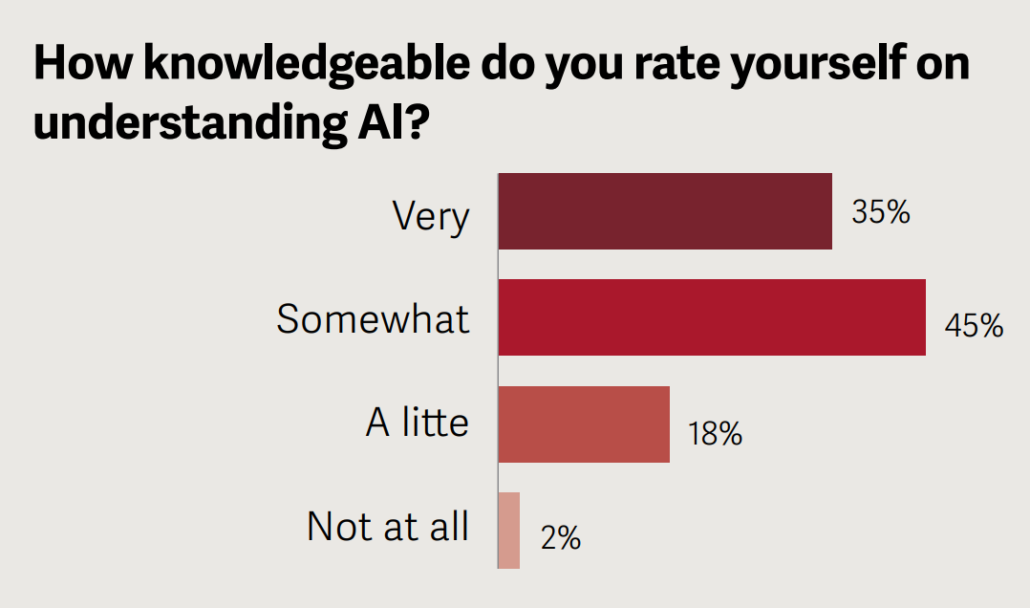The conversation around Artificial Intelligence in the legal industry has moved rapidly from theoretical potential to practical reality. Generative AI (GenAI), once a novel concept, now dominates discussions and is actively reshaping workflows. Understanding this evolving landscape is no longer optional—it’s critical for strategic planning and effective practice across corporate legal departments, law firms, government agencies, and the legal technology providers who serve them.
That’s why ACEDS is proud to release our third annual Artificial Intelligence survey report, produced this year in partnership with Secretariat. The 3rd Annual AI Report provides a crucial snapshot of industry sentiment, adoption trends, and the real-world challenges legal professionals are facing today. We’re also thrilled that the survey continues to expand its global reach, with insights gathered from professionals in 17 countries this year.
Key Insights from the 2025 Report:
Confidence and Integration are Growing
The legal industry’s understanding of AI is surging. A remarkable 80% of respondents now rate themselves as very or somewhat knowledgeable about AI, a significant jump from previous years. Furthermore, the expectation is that AI is becoming integral to daily work, with 74% anticipating their jobs will involve using AI technologies in the next 12 months.

GenAI Takes Center Stage
GenAI tools like ChatGPT and MS Copilot are widely used, primarily for tasks such as document drafting (47%), web searches (40%), and legal research (34%). Professionals predict GenAI will have the biggest impact on drafting, research, and information governance moving forward.
The Rise of Human-AI Collaboration
While adoption increases, the approach is nuanced. There’s cautious optimism that hybrid models, combining human oversight with AI capabilities, particularly in areas like document review, will become standard practice. Many see AI enhancing, not replacing, professional judgment.
Investment is Up, But Barriers Persist
Organizations are committing resources, with 57% planning to increase their AI investment compared to last year. However, significant hurdles remain. Key AI adoption barriers include concerns about data privacy/confidentiality (56%), cost (47%), the need for better education (34%), and the risk of AI hallucinations (31%). Notably, attorney education remains a primary impediment, particularly concerning the negotiation of ESI agreements involving TAR.

eDiscovery Professionals’ Evolving Role
The report sparks discussion on whether the influence of eDiscovery professionals, armed with AI tools, could expand beyond litigation support into broader information governance and knowledge management roles.
Navigate the Future with Data-Driven Insights
As AI continues its rapid evolution, staying informed is key. This report offers valuable data and perspectives for anyone working in legal technology and e-discovery. Whether your organization is enthusiastic and ahead of the curve or taking a more cautious approach, the findings provide benchmarks and insights to help you:
- Understand current AI usage patterns and anticipate future trends.
- Identify common AI adoption barriers and develop strategies to overcome them.
- Benchmark your organization’s approach against industry peers.
- Inform strategic decisions about technology investment and training.
ACEDS is committed to supporting the legal community through this transformation with resources, education, and initiatives like our Code & Counsel: Women in Legal & AI working group. This report is another vital tool to help you navigate the complexities and opportunities of AI in the legal field.
Download the full report today to explore the detailed findings, including survey results on AI in document review, ESI agreements, specific tools used, and demographic breakdowns.
Let’s continue the conversation and shape the future of legal technology together.
[View source.]